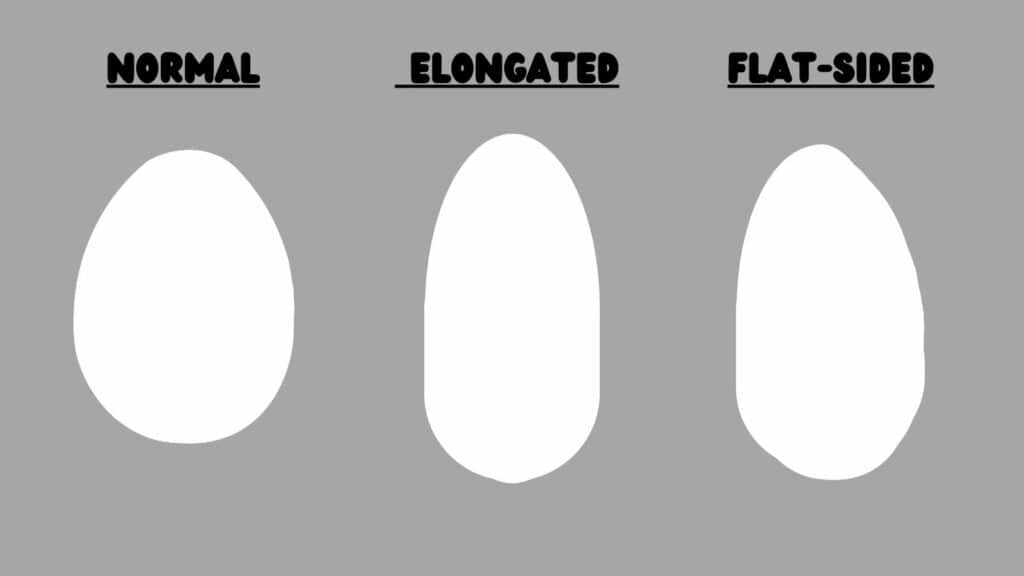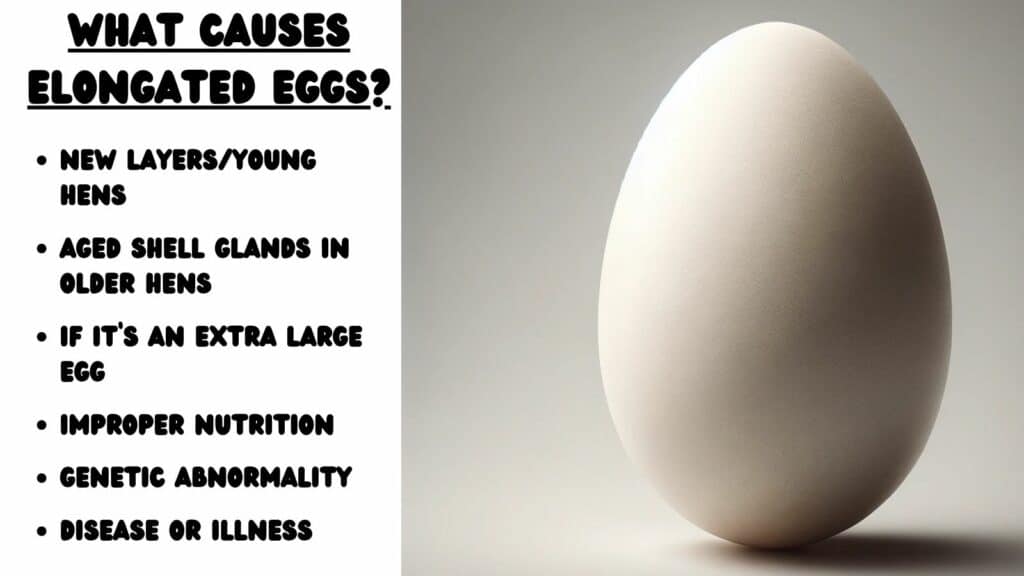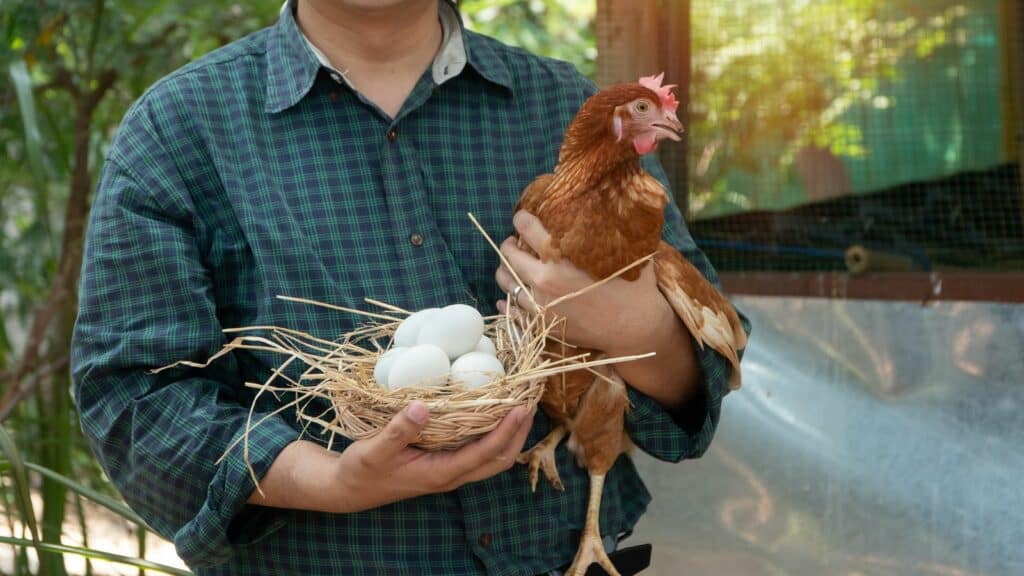Ask any chicken owner out there: fresh eggs from their backyard taste far superior to their commercial counterparts.
But, one thing we backyard chicken raisers have to put up with from time to time is some pretty weird eggs.
And I mean, some REALLY weird eggs.
If you’ve found a long, “elongated” egg, you’re not alone.
Here’s what causes elongated eggs in chickens, if they’re safe to eat, and what you can do to help your hens back to normality.

Contents
What Causes Elongated Eggs In Chickens?

Misshapen eggs come in all shapes and sizes, from speckled eggs to soft-shelled eggs, to tiny eggs too.
For many of these types of misshapen eggs, it can be fairly easy to find out what’s caused it. However, for some types of misshapen eggs, it’s not so clear-cut.
Although there is no one exact cause of a hen laying elongated eggs, there are a few common factors that regularly cause this hilariously misshapen egg. These include:
- You’ve got new layers on your hands!
- It’s an egg from an older hen.
- It was simply larger than the usual egg.
- Nutritional deficiencies.
- Genetic abnormality
- Illness or sickness.
Here’s what I mean.
Young Hens & New Layers
One certainty in the world of chickens is that young hens who are new to laying will have a drastically higher tendency to lay weirdly sized, or misshapen eggs.
There’s a reason the first clutch they lay is often referred to as their practice eggs.
This is because their reproductive and egg-laying systems are only just warming up, and each hen needs some time to “practice” egg-laying.
Heck, I can’t imagine what I would do if I suddenly had to start laying eggs.
If you’ve found an elongated egg or two from your young hens (under the age of 1), it’s most likely simply because they are still getting used to the whole egg-laying process!
Older Hens
Just like young hens, older hens also share a tendency to lay “weird” eggs too.
Setting aside the vast differences in egg production between different breeds (including heritage breeds vs. commercial layers), a hen’s peak egg-laying performance is generally between the ages of about 1 to 3 years old.
This is because their egg production systems are at their healthiest and most regular.
As your hens grow older, their egg production systems age and the glands that help produce the shell become less and less effective and efficient at doing so.
The result? More frequent, misshapen eggs, including elongated eggs.
An Abnormally Large Egg
It’s pretty normal for backyard chickens to lay slightly different-sized eggs now and then.
If your hen’s egg develops abnormally large then it often ends up a big elongated too!
Improper Nutrition
Improper nutrition is a bit of a blanket statement that’s thrown around as it’s an easy thing to blame for weirdly misshapen eggs.
In reality, even hens who are fed consistently optimal diets can succumb to a few egg troubles now and then.
So although it’s true that improper nutrition CAN lead to elongated eggs, as long as you aren’t getting them consistently, it’s likely not the root cause!
Genetic Abnormality
If you literally can’t stop getting elongated eggs, it might be caused by a genetic abnormality in one of your hens!
It could simply be that their egg production system is slightly estranged, causing consistent problems in eggshell production, leading to elongated or “flat eggs”.
This is generally only the case for those chickens that will ONLY lay elongated eggs.
Disease Or Illness
Again, an elongated egg (or other weirdly shaped egg) now and then is completely normal.
However, if you’re finding more and more elongated eggs, or other weird shapes/shell-less eggs, or soft eggs then it can be a sign of disease or illness, like Avian influenza or Newcastle Disease.
Is It Safe To Eat An Elongated Egg?
As strange as these eggs may look, there is absolutely nothing wrong with their taste and they pose no health risks.
Yup, it may seem a bit strange breaking one of these open, but I assure you, the inner white and yolk will look normal in 99% of cases.
Therefore it’s completely safe to eat an elongated egg, just as safe as if it was extra round, a little smaller, or a jumbo egg with blood on its shell.
How To Prevent Elongated/Misshapen Eggs?

Of course, setting aside the fact that it’s near impossible to get a perfect egg from your hens every single time (mistakes happen, after all!).
There is one important duty you can do as a chicken owner to help prevent elongated, and any other misshapen eggs.
It’s simple.
Provide your chickens with food, water, shelter, sunlight, and a little bit of tender love and care.
So long as you’re doing the basics well and your chickens have enough protein and adequate calcium (amongst all other essential nutrients), then you’re giving your hens the best chance of consistent and regular egg laying.
Expert Insights On Weird Eggs
Don’t just take my word for it.
Other industry leaders like Lisa Steele from Fresh Eggs Daily agree that an abnormally shaped egg every now and then is completely normal, and almost unavoidable.
The University Of Georgia covers twelve of the most common abnormal eggs, showcasing some truly strange eggs, the likes of which make an elongated egg seem normal!
To Summarize
If you find an elongated egg now and then, don’t panic. Your girls are completely fine, and it’s considered pretty normal.
Elongated eggs are most commonly caused by new layers, older hens, or if it’s simply a larger egg than normal!
Of course, there’s no denying that nutritional deficiencies illness, or sickness can also play a part.
But, unless you’re getting elongated eggs consistently, or your hens are experiencing other abnormal symptoms, then there is nothing you need to change or do differently.
Happy backyard farming everyone!
